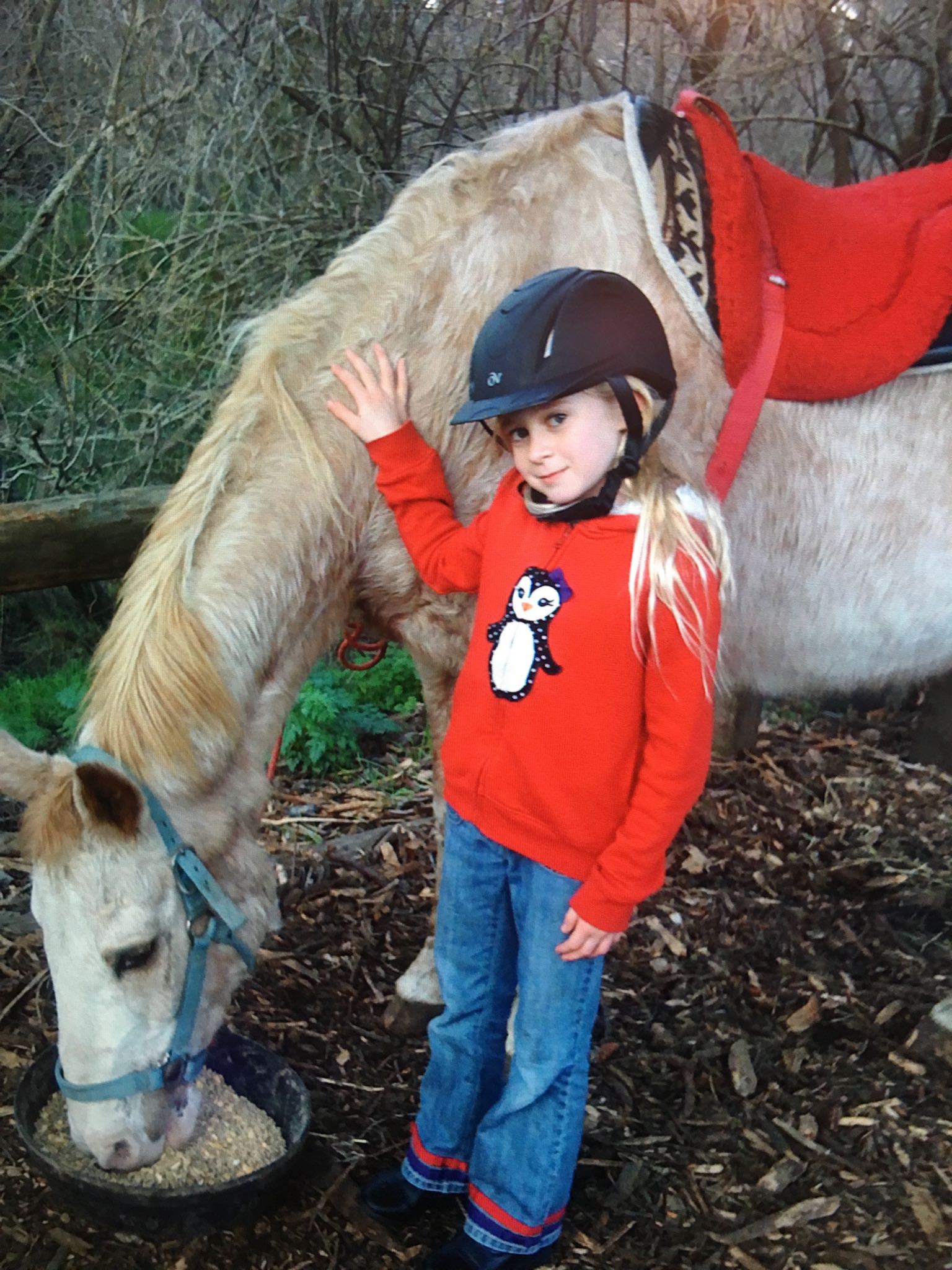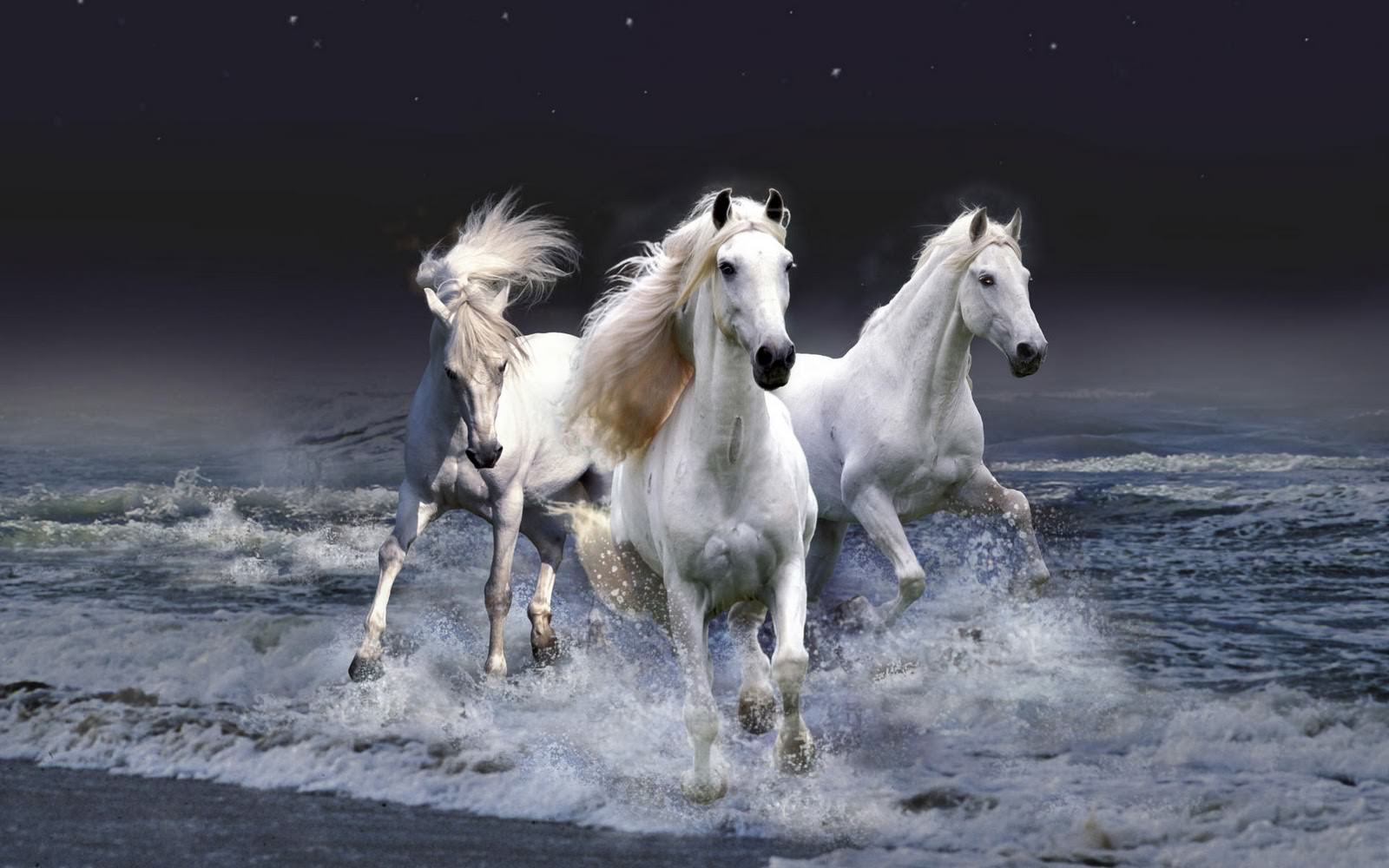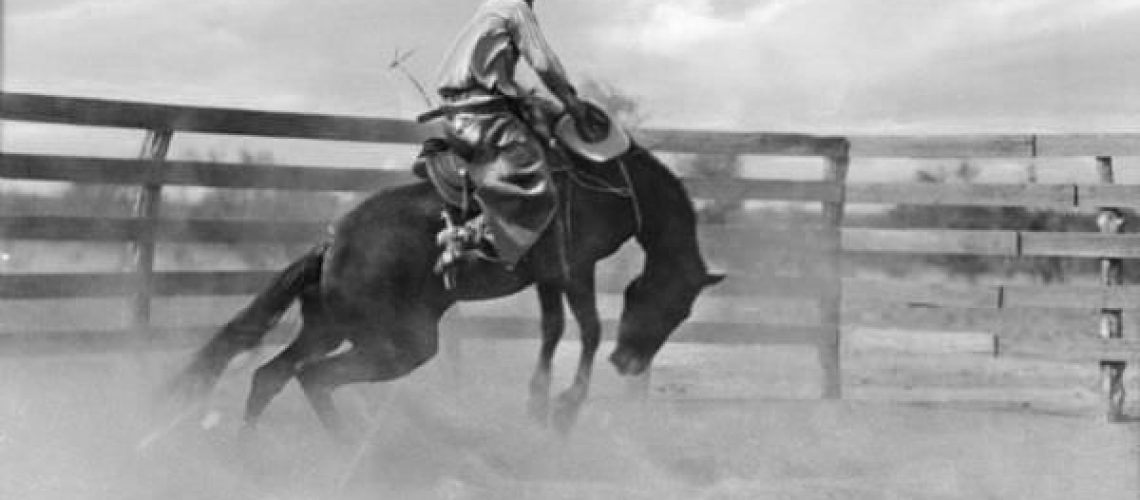People notice something about Happy Body practitioners beyond weight loss—friends often remark that they have a new sparkle in their eye and a spring in their step, almost like a racehorse. In fact, someone once said to me that our gym is like a training stable for thoroughbreds who emerge sleek, confident and performing at their best. That made me think of the process that young horses go through to become champions.
When my daughter Natalie fell in love with horseback riding, she fell more in love with horses than with riding itself. The first horse she rode was Rosie, a calm senior horse, and the two developed a strong sense of mutual respect. Despite being only six, Natalie understood the size and power of horses and also how sensitive they were—their skin, their hearing, their emotions. She was more interested in brushing, bathing and caring for Rosie than in perfecting her skills in the ring. If Natalie could choose what to do for her hour on horseback, she’d select trail-riding, where she and Rosie could both enjoy getting out in nature together.

One day Natalie asked how horses could be changed from wild creatures who used to roam the plains to domesticated allies who work with humans in partnership. Together we watched a documentary that illustrated two methods of training. The first, mainly used by poorer populations living on the edge of survival who had to “break” horses quickly for sale, was brutal. It was difficult to watch—the horses were abused and their spirits were broken. They performed, but they did it as slaves. They wouldn’t initiate anything or interact with people beyond doing what they had to because they were forced. The second method took more time but it caused no pain and suffering. The trainer established a relationship with the horse, developing a sense of trust and forming a partnership where there was mutual respect. In the end the trainers had eager, responsive horses who would do almost anything asked of them.
So is spending time training horses a luxury or a necessity? I believe that there are no “bad” horses. Wild horses may have certain habits that won’t work in the horse/rider partnership, but by befriending them, these can be overcome. Is spending time working with our emotions a luxury or a necessity for creating inner alignment? In mentoring Happy Body clients, I often see people who have broken or “killed” their “horses.” Their emotions are deadened and they follow their strict, old habits like slaves. Many of our clients are highly successful natural leaders, very capable of mastery in other aspects of their lives. They’re aware that they haven’t developed a healthy lifestyle and they don’t know how to rejuvenate. Some of these clients complain of chronic fatigue, or a lack of interest or energy—another clear sign that their heart isn’t in what they’re making themselves do. They also have no understanding of how to train their inner horses so they can work in partnership with their emotions. The emotions that usually surface first are frustration, embarrassment, anger, and shame or defensive pride, a sign that the inner relationship isn’t healthy.

As mentors, we understand the power of emotion. All our energy goes into helping people overcome their emotional obstacles—through poetry, stories, meditation and relaxation—so they can begin to build a relationship with their own emotions. We are trying to help them light the fire from within; we know that it’s the only key to real change.
The process of training a horse or working with emotions is ongoing—you can’t ignore your horse in a stable for three months and expect to win a race. The exploration of this topic reminded me how thoughtful you have to be: You have to have daily rituals and habits that support your emotional wellbeing. If you are emotionally well then your physical body will follow.

DEEPER CONTEMPLATION
In your intimate relationships with family and close friends, how do you work with your emotions? How do you train yourself to avoid outbursts or negative, hurtful behavior—even when you’re under stress? Have you developed any effective methods? Would you like to share them?
Leave your response below in the comments.



Thanks so much for your lovely wisdom and the story about your daughter (who is adorable!)
I have learned how to respond more than react to loved ones by sitting quietly in the morning for 25 minutes and listening to my breathing
I believe it has helped me be a kinder person to myself and others.
Again
Thanks for your email
PS
Happy Body workout is my main source of movement therapy !
Thank you Judith for your comment. I believe that many of our problems could be solved by being mindful and being fully present in the moment. Simlpe awarness of our breath, how it quickens when we are anxious and slow and steady when relaxed, reflects our state of mind. Being kinder to yourself and being kinder to others starts with slowing down.
Love the idea of THB movement therapy! Mobility first and that’s happy body – pain free.
Hi Aniela,
Thank you for the beautiful analogy about horses and emotions which makes more sense to me that we need time develop our emotional well-being. I wonder what are the habits and rituals that we should start to conquer our emotions? Could you elaborate your personal habits? And second, how do I know that I have mastered my emotions?
Hi Fariz,
Thank you for commenting! The whole idea of The Happy Body Program was to bring principles to everyday living that calm you down because you know what to do, how much to do, and when to do it. It’s a matter of time and aligning yourself with the practice—others will eventually notice that you’re different: calmer, happier, even funnier. That’s how you’ll know that your emotional life is coming together. You don’t have to conquer emotions, which is too close to killing them—but you do have to create a relationship that will bring them under control.
I hope your horses will be nurtured and happy running on the green pasture when their work is done and you need leisure time.
Warmly,
Aniela
I love the blog. So insiteful and helpful. I am working with THB program. It has shown me how out of balance my body is. Very tight here, very weak there. I want a HB, so I’m trying to listen to what THB program is telling me. 🙂
Hi Peter,
We see this kind of imbalance quite often in our work–THB definitely offers a solution to this. With time and practice you’ll see the results. Keep up the good work!
Aniela
Hi Aniela,
I am new to the Happy Buddy but my friend swears on it and tells me it works 100%. I have limited time in the morning but could implement it through the day in short periods. Am I qualified to try it with limited time in the morning?
Welcome Derek,
Of course you are qualified, it’s your willingness that counts.
The best is to start with a timeframe that suits you so it’s not overwhelming. Our practitioners adjust their routine to their schedules – if you go to our webpage’s Q&A there are some ideas you might adapt. When you experience the benefits of the program you will begin to connect to long term goals established through the six standards of THB. After all it’s a lifetime commitment to get better, yes? Good luck with you pursuit. Good timing with New Years resolutions!
Warmly,
Aniela
Just saying hello, and to add to how valuable the relaxation segment of THB is to keeping those horses in check all day! Aniela – I am in Jerzy’s current cohort of THB Mentors, and just loving it 🙂
Hi Kevin,
Nice to meet you, and thank you for introducing yourself here. I’m glad you are enjoying the whole process of becoming a happy body and preparing for future mentoring. Nothing beats the firsthand experience. Looking forward to get to know you better as we plant the grassroots of THB.
Warmly,
Aniela